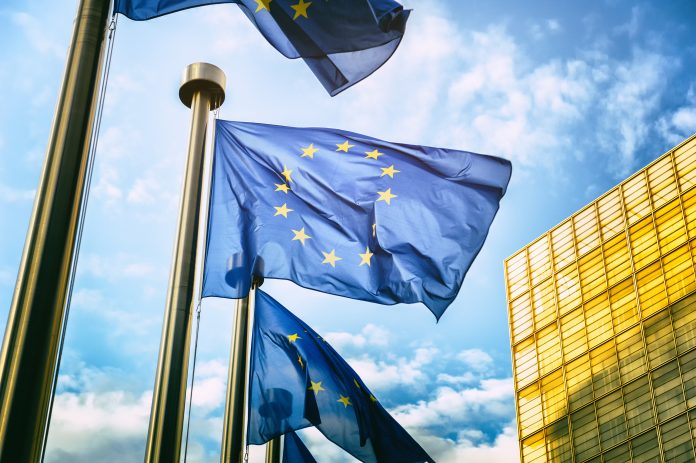EU Commissioner Mariya Gabriel shares her ambitious policy plans on the coronavirus pandemic, especially in relation to research and innovation in Europe
According to the Commissioner of Innovation, Research, Culture, Education and Youth, the only way for Europe to recover from the coronavirus crisis is to work together. She is incidentally the first member of the von der Leyen Commission to be tested positive for the virus herself, undertaking a period of self-isolation in prelude to her 10 October results.
Will her Commission-unique insight into experiencing COVID-19 as a patient impact any of her ambitions post-pandemic? Let’s look at her current research and innovation priorities.
‘We continue to combat the virus’
The scientific community has produced over 6000 journal articles and counting since COVID-19 emerged as a global problem. This body of work comes from scientists and researchers who have been working non-stop to understand how to stop and diminish this virus.
Looking to the EU mechanisms that exist to make this process easier, Commissioner Gabriel commented: “As early as January, we mobilised Horizon 2020 (the EU’s current research funding programme) into urgently needed coronavirus research and innovation. All this gives us hope, as we continue to combat the virus and work hard to make Europe more resilient and sustainable.
“At the end of September, I presented my key initiatives for a European research area, a European education area and a digital education action plan, which contribute to a more inclusive, greener and digital Europe when it comes to research and education.”
When Commissioner Gabriel took office, one of her major critiques were that she lacked digital experience – so the now urgent migration of services to the digital landscape became a major learning curve. These new initiatives were also welcomed by President von der Leyen, who stressed the importance of the EU keeping ahead of the pulse on “digital technologies and geopolitics” in Gabriel’s 2019 appointment letter.
EU’s research priorities for coronavirus
In context of the vaccine, Professor Tedros, WHO Director-General, has consistently warned the world about equal access to any available vaccines, decrying “vaccine nationalism” as a detriment to defeating COVID-19. Speaking at a conference in Geneva, he said: “If and when we have an effective vaccine, we must also use it effectively. In other words, the first priority must be to vaccinate some people in all countries, rather than all people in some countries.”
To make this possible, the COVAX global vaccine allocation plan was launched. It currently has 184 countries signed up to donate money and resources that will ensure the vaccine reaches developing countries. On 12 November, the European Commission further raised their contribution by €100 million euros, taking their total input to €500 million – putting the EU in the lead as one of the largest donors to the programme.
Jutta Urpilainen, Commissioner for International Partnerships, said: “The EU is demonstrating we are serious about our commitments to leave no one behind and make the COVID-19 vaccine a global public good.”
The COVAX facility will attempt to purchase 2 billion doses of the vaccine by 2021. Commissioner Gabriel proposes a “sustainable and inclusive” EU recovery from COVID-19, which means funding for a range of scientific endeavours, alongside aid to developing countries.
‘A total of 2,253 partnerships’
The EU are investing over €1 billion as part of the Coronavirus Global Response, while attempting to even out the disparity in research and innovation progress that exists between various regions of Europe. Further to this, Commissioner Gabriel prioritised the pursuit of open information sharing networks – from researchers to community leaders to policymakers, the EU would function as a unit. This includes RE-open EU, a border monitoring platform that clarifies all the restrictions in each EU country, and theoretically enables small businesses in the tourism industry to survive. The more information, the more chance of containing and defeating this infection – but also, of surviving it economically and physically.
Commissioner Gabriel further discussed the pragmatic realities of supporting the EU: “We also launched short- and long-term activities. For example, nearly 30,000 people from 114 countries participated in the EUvsVirus hackathon to generate 2,150 innovative solutions by the end of April. A total of 2,235 partnerships which span different forms of funding and benefits, such as mentoring, were brokered by the European Innovation Council (EIC). The EIC also awarded €166m for the development of solutions to combat the coronavirus pandemic.
“In April, we initiated an action plan, which was adopted by Member States and helped to coordinate all the research and innovation efforts with national administrations, focusing on coordination of funding, research data and information exchange. In less than two weeks (on 20 April) we launched the European COVID-19 data portal to enable the rapid collection and sharing of available research data to support researchers in Europe and around the world.
“In Horizon Europe, the next EU research and innovation funding programme that runs from 2021-27, health projects will cover virology, vaccines, treatments and diagnostics, and the translation of research findings into public health policy measures.”
Role of R&I for recovery
When it comes to policy-cohesion, the Commissioner appears to be unafraid to push the issue and solve it. Member States recently received a strong guideline for an LGBTQ+ strategy, which was targeted to those states in which human rights are seeing significant erosion. While the Commission is unable to legally enforce policy, COVID-19 has presented an opportunity to unify approaches to issues like health and social care.
Commissioner Gabriel further commented on the necessity of Horizon Europe in meeting the dreams of policy cohesion: “Its new wave of European Partnerships will ensure long-term strategic cooperation between public and private actors covering critical areas such as energy, transport, biodiversity, health, food and circularity.
“We also should not underestimate the impact this crisis has on people’s mental health, such as the psychological impact of quarantines. We will continue to support research in social sciences and humanities, as well as in behaviour and mental health. For example, we supported four new research projects with €28 million to investigate behavioural, social and economic impacts of the outbreak responses.”
Horizon Europe budget
However strong the overall economic investment being made by the EU, the summer of fierce budget negotiations between the Commission and the Council remain close to the surface of R&I discussions.
There was turbulence with the proposed 2021-2027 budget in May. While President von der Leyen aimed for a lofty, but all encompassing height of €1.1 trillion Multiannual Financial Framework (MFF), the European Council actually ended up passing a smaller, €1.074 trillion MFF on 21 July. When the MFF was negotiated, especially in light of COVID, countries were bitterly divided about how to finance some of the economic recovery packages that went to countries like Italy and Spain. Whilst some asked for those to be grants, others were insistent that these investments be treated as loans.
Pushing for a bigger, more flexible budget back in April, von der Leyen commented: “The next seven-year MFF budget has to adapt to the new circumstances, post-corona crisis. We need to increase its firepower to be able to generate the necessary investment across the whole European Union.”
Reflecting on that policy-changing fiscal disagreement now, Commissioner Gabriel said:
“Like President von der Leyen, I have expressed that the budget reduction is a regrettable decision. We believe that the original Commission proposal was ambitious, but also realistic. Nevertheless, after the July European Council, Horizon Europe still keeps a robust budget envelope to prepare the competitiveness of the European economy for the widest social benefit of the citizens. And we need to recognise that additional funds will also be allocated from Next Generation EU, the €750 billion recovery instrument for Member States, to Horizon Europe.
“On 29 September, Member States came to agreement on the last remaining open issues of Horizon Europe concerning budget, international cooperation and synergies with other EU programmes. The Commission will act as an honest broker in the forthcoming trilogues (negotiations between the Council, Parliament and Commission) on the new budget. A timely agreement on Horizon Europe is in the best interest of our researchers, innovators, companies but most importantly citizens.
“We need to be concrete about what we want to achieve in the short term: to bridge the innovation divide (the difference in innovation capacity between different parts of Europe), to foster a fair and just transition, to develop innovation ecosystems in every region in Europe, and to provide the necessary resources for all our talent.”
Whilst it is yet to be seen how research, innovation and all attempts to protect the economy will come to fruition, it seems that Commissioner Gabriel remains ambitious and determined to make this recovery inclusive enough to make the EU stronger post-pandemic.
“To be ready for the next crisis, we must support researchers and innovators to work together, share results and data openly and acquire the skills they need to provide us with solutions for our societal challenges.”
“The EU can only succeed if everyone progresses.”











